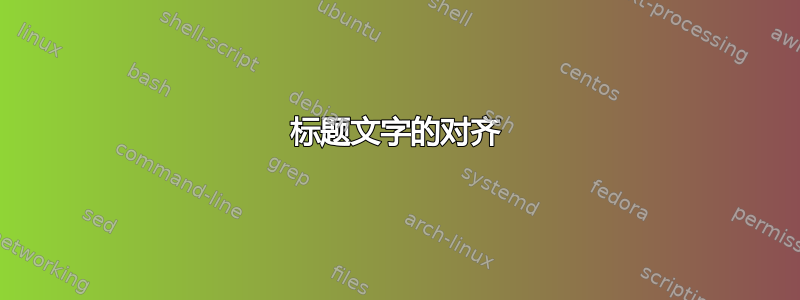
我希望我的长标题文本能够对齐。如下图所示:

我插入了一条红线,这样我希望所有文本都位于该线的右侧(对齐)。我该如何实现?以下是我的 MWE:
\documentclass[12pt,openany,twoside]{book}
\raggedbottom
\usepackage[
left=2.5cm,
right=2.5cm,
top=3cm,
bottom=3cm,
headheight = 3\baselineskip,
headsep = 5mm,
a4paper
]{geometry}
\usepackage{amssymb}
\usepackage{amsmath}
\usepackage{amsthm}
\usepackage[table]{xcolor}
\usepackage{graphicx}
\newcommand\HRule{\noindent\rule{\linewidth}{1.5pt}}
\usepackage{background}
\backgroundsetup{contents={}}
\usepackage{fancyhdr}
\usepackage{hhline}
\fancypagestyle{fancy}{%
\fancyhf{}
\fancyhead[OL]{\leftmark}
\fancyhead[ER]{\rightmark}
\fancyfoot{}
\fancyfoot[RE,RO]{\thepage}
\renewcommand\headrule
{{ \color{blue}\rule{1\headwidth}{2.5pt}%
}}
}
\fancypagestyle{plain}{%
\fancyhf{}%
\renewcommand\headrule
{{ \color{blue}\rule{1\headwidth}{0pt}%
}}
}
\pagestyle{fancy}
\usepackage{showframe}
\begin{document}
\chapter{ABCD}
eehehdhdhdhddddddddddddddddddddddddddd
\pagebreak
\section{Special keyboard characters gghthr rhrrhd fheheh fhehuw fhewiwi feiwiwd fiiwiwid fiiwiwi firiifn rokfkkvfvv fjjjeje jejeje djej}
\LaTeX{} has many symbols at its disposal. The majority of them are within the mathematical domain as shown in \eqref{eq:1} and \eqref{eq:2}. The ten special keyboard characters are: \verb|#|, \verb|$|, \verb|%|, \verb|&|, \verb|~|, \verb|_|, \verb|^|, \verb|\| and \verb|{}|. If you simply want the character to be printed just as any other letter, include a \verb|\ | in front of the character. For example, \verb|\$| will produce \verb|$| in your output.
The exception to the rule is the \verb|\ | itself because \verb|\\ | has its own special meaning. A \verb|\ | is produced by typing \verb|$\backslash$| in your file.
\end{document}
答案1
将右侧标记放置在tabularx比线宽更窄的位置,左边距应为所需的范围(14ex在此示例中)。
更新在后续问题之后。
长章节标题和短章节标题。
\documentclass[12pt,openany,twoside]{book}
\raggedbottom
\usepackage[
left=2.5cm,
right=2.5cm,
top=3cm,
bottom=3cm,
headheight = 3\baselineskip,
headsep = 5mm,
a4paper
]{geometry}
\usepackage{amssymb}
\usepackage{amsmath}
\usepackage{amsthm}
\usepackage[table]{xcolor}
\usepackage{graphicx}
\newcommand\HRule{\noindent\rule{\linewidth}{1.5pt}}
\usepackage{background}
\backgroundsetup{contents={}}
\usepackage{fancyhdr}
\usepackage{hhline}
%****************************************
\usepackage{tabularx}% added <<<<<
\newlength{\leftspace}% for sections <<<<<<<<<
\setlength{\leftspace}{14ex}%
\renewcommand{\sectionmark}[1]{\markright{\uppercase{#1}}}
\fancypagestyle{fancy}{%
\fancyhf{}
\fancyhead[OL]{\leftmark}
\fancyhead[ER]{%
\begin{tabularx}{\dimexpr\textwidth-\leftspace}{@{}lX}\thesection&\rightmark\end{tabularx}}% changed <<<<<<<<<<
\fancyfoot[RE,RO]{\thepage}
\renewcommand\headrule{\color{blue}\rule{1\headwidth}{2.5pt}}
}
%****************************************
\fancypagestyle{plain}{%
\fancyhf{}%
\renewcommand\headrule
{{ \color{blue}\rule{1\headwidth}{0pt}%
}}
}
\pagestyle{fancy}
\usepackage{showframe}
\begin{document}
\chapter{ABCD}
eehehdhdhdhdddddd ddddddddddddddddddddd
\pagebreak
\section{Special keyboard characters gghthr rhrrhd fheheh fhehuw fhewiwi feiwiwd fiiwiwid fiiwiwi firiifn rokfkkvfvv fjjjeje jejeje djej}
\LaTeX{} has many symbols at its disposal. The majority of them are within the mathematical domain as shown in \eqref{eq:1} and \eqref{eq:2}. The ten special keyboard characters are: \verb|#|, \verb|$|, \verb|%|, \verb|&|, \verb|~|, \verb|_|, \verb|^|, \verb|\| and \verb|{}|. If you simply want the character to be printed just as any other letter, include a \verb|\ | in front of the character. For example, \verb|\$| will produce \verb|$| in your output.
The exception to the rule is the \verb|\ | itself because \verb|\\ | has its own special meaning. A \verb|\ | is produced by typing \verb|$\backslash$| in your file.
\clearpage
\setcounter{page}{4}
\section{Special keyboard characters}
Some text.
\end{document}



